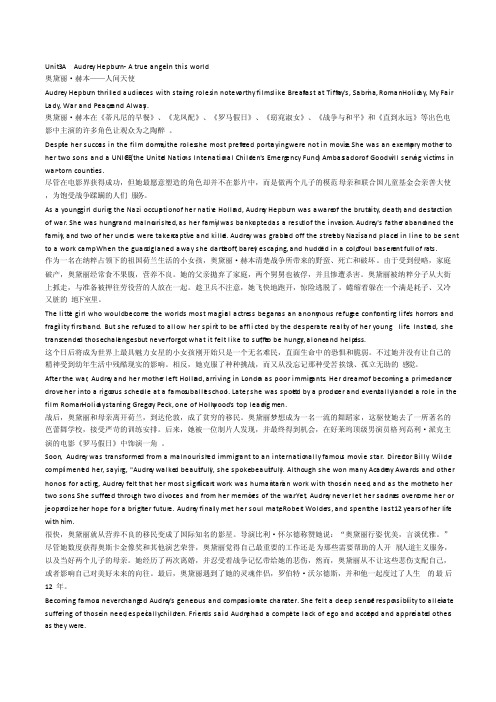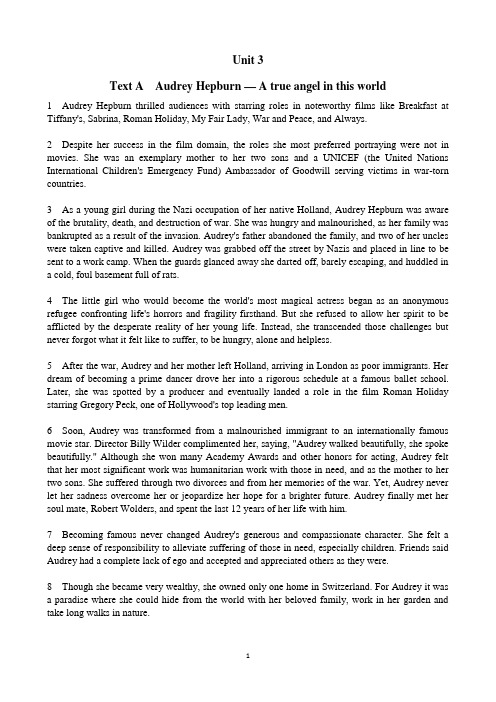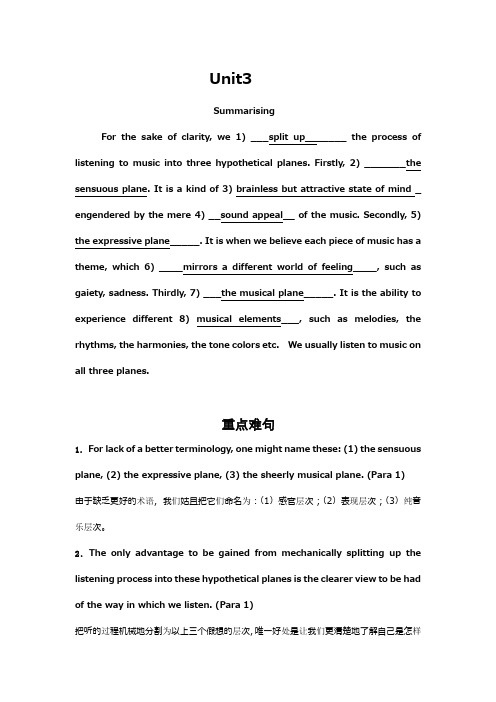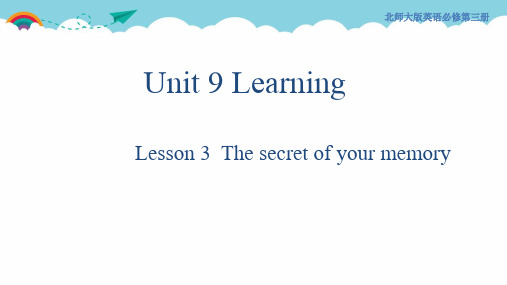unit3 A place lingering in our memory
新视野大学英语第三版读写教程第三册读写Unit3A课文及翻译

Unit3A Audrey Hepbur n- A true angelin this world奥黛丽·赫本——人间天使Audrey Hepbur n thrill ed audien ces with starri ng rolesin notewo rthyfilmslike Breakf ast at Tiffan y's, Sabrin a, RomanHolida y, My Fair Lady, War and Peace, and Always.奥黛丽·赫本在《蒂凡尼的早餐》、《龙凤配》、《罗马假日》、《窈窕淑女》、《战争与和平》和《直到永远》等出色电影中主演的许多角色让观众为之陶醉。
Despit e her succes s in the film domain, the rolesshe most prefer red portra yingwere not in movies. She was an exempl ary mother to her two sons and a UNICEF (the United Nation s Intern ation al Childr en's Emerge ncy Fund) Ambass adorof Goodwi ll servin g victim s in war-torn countr ies.尽管在电影界获得成功,但她最愿意塑造的角色却并不在影片中,而是做两个儿子的模范母亲和联合国儿童基金会亲善大使,为饱受战争蹂躏的人们服务。
As a younggirl during the Nazi occupa tionof her native Hollan d, Audrey Hepbur n was awareof the brutal ity, death, and destru ctionof war. She was hungry and malnou rishe d, as her family was bankru ptedas a result of the invasi on. Audrey's father abando ned the family, and two of her uncles were takencaptiv e and killed. Audrey was grabbe d off the street by Nazisand placed in line to be sent to a work camp. When the guards glance d away she darted off, barely escapi ng, and huddle d in a cold, foul baseme nt full of rats.作为一名在纳粹占领下的祖国荷兰生活的小女孩,奥黛丽·赫本清楚战争所带来的野蛮、死亡和破坏。
Useful Expressions

10.know better: behave in a more sensible and acceptable way He is old enough to know better. 他很明事理,不至于以貌取人。 He knows better than to judge by appearances. Pattern: know better than sb. know better than to do sth.
2) v. risk (money) on the result of a future event
I bet on the wrong horse. It lost the race.
6.hand down: give or leave to people who are younger or come later
13. 善意的 14. 前来帮助某人
come to sb.’s rescue
15. 极其熟练、温和地 with extreme facility and gentleness 16. 适用于 17. 发展到 18. 发展创造力 19. 值得追求的目标 apply to
evolve to
promote creativity worthwhile goals
15. 转折点 16. 与„形成对比
a turning point in contrast to focus on a sense of belonging go through a rough time a lingering smile be thankful for the lowest income bracket the gift of creativity
Unit 2 Useful Expressions 1. 面临,遭遇 2. 仰头向上看 3. 填写 4. 属于 5. 仅仅,不多于,不强于„ 6. 转瞬即逝的念头 7. 磨损,损耗 be confronted with look up at
人教版高中英语选择性必修第三册 Unit 3 Section Ⅲ

He dropped the glass to the ground,breaking it into pieces.
他把玻璃杯掉到了地上,结果摔成了碎片。
Carbon burns in oxygen or air,therefore forming carbon dioxide.
碳在氧气或空气中燃烧,因此形成二氧化碳。
/̍tɒləreIt/ vt.忍受;包容;容许
/ə̍dʒendə/ n.议程表;议事日程
二、短语英汉互译
1.be harmful to
对……有害
2.have negative effects on
3.dozens of
4. in effect
对……有消极影响
许多;很多
有效;实际上;事实上
5.
struggle with
C.fining tourist organisations for abuses
D.attracting more factories to invest in the Li River
答案:D
.
4.The local authorities began to use the media to
A.spread environmental awareness
【合作探究】
记一记·长知识
动词-ing形式做结果状语常表示意料之内、情理之中的结果,而不定式做
结果状语常表示出乎意料的结果。
I rushed to the school,only to find it was Sunday.
我冲到学校,结果发现是星期天。
【即学即用】
单句语法填空
①The storm ended after a week,
新视野大学英语第三版读写教程第三册Unit3课文原文(A+B篇)

Unit 3Text A Audrey Hepburn — A true angel in this world1 Audrey Hepburn thrilled audiences with starring roles in noteworthy films like Breakfast at Tiffany's, Sabrina, Roman Holiday, My Fair Lady, War and Peace, and Always.2 Despite her success in the film domain, the roles she most preferred portraying were not in movies. She was an exemplary mother to her two sons and a UNICEF (the United Nations International Children's Emergency Fund) Ambassador of Goodwill serving victims in war-torn countries.3 As a young girl during the Nazi occupation of her native Holland, Audrey Hepburn was aware of the brutality, death, and destruction of war. She was hungry and malnourished, as her family was bankrupted as a result of the invasion. Audrey's father abandoned the family, and two of her uncles were taken captive and killed. Audrey was grabbed off the street by Nazis and placed in line to be sent to a work camp. When the guards glanced away she darted off, barely escaping, and huddled ina cold, foul basement full of rats.4 The little girl who would become the world's most magical actress began as an anonymous refugee confronting life's horrors and fragility firsthand. But she refused to allow her spirit to be afflicted by the desperate reality of her young life. Instead, she transcended those challenges but never forgot what it felt like to suffer, to be hungry, alone and helpless.5 After the war, Audrey and her mother left Holland, arriving in London as poor immigrants. Her dream of becoming a prime dancer drove her into a rigorous schedule at a famous ballet school. Later, she was spotted by a producer and eventually landed a role in the film Roman Holiday starring Gregory Peck, one of Hollywood's top leading men.6 Soon, Audrey was transformed from a malnourished immigrant to an internationally famous movie star. Director Billy Wilder complimented her, saying, "Audrey walked beautifully, she spoke beautifully." Although she won many Academy Awards and other honors for acting, Audrey felt that her most significant work was humanitarian work with those in need, and as the mother to her two sons. She suffered through two divorces and from her memories of the war. Yet, Audrey never let her sadness overcome her or jeopardize her hope for a brighter future. Audrey finally met her soul mate, Robert Wolders, and spent the last 12 years of her life with him.7 Becoming famous never changed Audrey's generous and compassionate character. She felt a deep sense of responsibility to alleviate suffering of those in need, especially children. Friends said Audrey had a complete lack of ego and accepted and appreciated others as they were.8 Though she became very wealthy, she owned only one home in Switzerland. For Audrey it wasa paradise where she could hide from the world with her beloved family, work in her garden and take long walks in nature.9 In 1988, Audrey was appointed a Goodwill Ambassador for UNICEF designed to provide emergency food and healthcare to children suffering the destruction of war or other catastrophes. In that role, her lifelong passion for helping those in need, found its greatest calling.10 She turned down three million dollars to pen her autobiography and instead accepted one dollar a year in the more conscientious role as diplomat for UNICEF. For seven months out of each of her last five years, she and Robby left the peace and beauty in their cozy home to embark on outreach trips into some of the most difficult places on earth. From Bangladesh, Sudan, India, Vietnam, Kenya, Ethiopia, Central and South America, to Somalia, Audrey Hepburn traveled representing UNICEF, making over 50 emotionally draining and physically dangerous missions into bleak destinations to raise world awareness of wars and droughts. Having been a victim of war, she understood the blessing of being the beneficiary of food, clothing, and, most of all, hope.11 Audrey felt it was wicked that billions of children were deprived of simple joys and drowned in overwhelming misery. She believed deeply in the ideology that all people share in the duty to care for those in need. Audrey Hepburn was always ready to lead by example. She said: "When you deny childhood, you deny life." She saw UNICEF's work as an integral, sacred force in people's lives and said of UNICEF's results, "Anyone who doesn't believe in miracles is not a realist."12 In 1992, Audrey was stricken by cancer. She, Robby and her two sons returned to their home in Switzerland for their last Christmas together.13 Audrey's long-time friend and world-famous French fashion designer, Hubert de Givenchy, spoke to his cherished friend for the last time, just before she died. He said she was "... serene at the end because she knew she had achieved everything with perfection".14 Audrey Hepburn's passion for service was enduring. Even as her life ended at 63 years of age, she remained a gracious woman who perpetually signified simplicity, charity, charm and kindness.15 The majesty of Audrey Hepburn's spirit of social responsibility and dedication lives on in her words: "Remember, if you ever need a helping hand, it's at the end of your arm. As you get older, remember you have another hand: The first is to help yourself, the second is to help others." And "For beautiful eyes, look for the good in others; for beautiful lips, speak only words of kindness; and for poise, walk with the knowledge that you are never alone."Unit 3Text B A life in filmSteven had to face rejections and obstacles in his film-creating efforts, but his persistence and dedication transformed the obstacles into an alternative route to success.1 At 12 years old, Steven Spielberg was already visiting film shootings at Universal Studios in his office suit, a packed lunch tucked into his briefcase. The young boy tried to immerse himself in film in any way possible. He had been given an administrative job at Universal Studios from a friend of his father's, and every day, even though he didn't have a legitimate security pass, he would try to manipulate his way past the guards and into his personal paradise. Such persistence is hardly surprising from a boy whose lifelong conviction was to "Make sure you are right and go on!" (adopted from a 1954 Disney film).2 When Steven was eight years old, his father gave him a Brownie 8 mm film camera as his birthday present. Steven immediately began collecting footage of family events, and he simulated action scenes with his miniature toy spacecraft, populating his films with his neighborhood friends as actors. People quickly began to recognize his terrific talent, and he won a prize for cinematography for his early westernThe Last Gunfight; years later, he won a national contest for his film Escape to Nowhere. His film Firelight was twice analyzed by a national newspaper and was presented in the city theater as if it were a Hollywood premiere. By the time he was 17 years old, Steven had established himself as a director with the artistic intuition of a man twice his age.3 His achievements are certainly related to the personal obstacles and setbacks he faced from an early age. Steven's family moved often, so that he was constantly trying to find his place in a turbulent environment with new people. Despite his natural intelligence, Steven had a carefree attitude and put little effort into school. He consistently earned only a C average, or lower. Socially, he wasn't athletic or popular, and since his conspicuous interest in film made him seem eccentric, classmates shunned and mocked him.4 His home life was not ideal either, as his father's rigid engineering temperament could not understand his or his mother's artistic personalities. Steven would miss his father when he was gone for long work trips, and then reverted to furiously arguing with him as soon as he returned. Finally, when he was in high school, his parents ended their unhappy marriage with a divorce. The theme of the lack of a father figure consistently infected Steven's films.5 Unfriendly surroundings at home and school made Steven strive even harder to achieve in the film world. He applied to two of the best film schools in the country: the University of Southern California and the University of California, Los Angeles. But even with a formidable 10 years of experiences in filmmaking and his friends atUniversal Studios endorsing him, his grades were too poor, and he was flatly turned down at both institutions.6 Unwilling to give up, Steven entered the California State University, where he hoped the program in TV and radio might open his way to Hollywood. Unfortunately, the university was not suited to his experience, and one academician recalled, "Steven knew more about cameras, mounts, and lenses than anyone else in the department. He could teach there." Despite his manifest talent, his low grades sabotaged transfer attempts, forcing real film schools to withhold acceptance.7 Steven contrived to rectify the situation on his own by diverting his attention away from academics. He cleaned his old suit and briefcase and returned to visiting Universal Studios where he had worked as a boy. He discreetly sneaked into any department he could, such as shooting rooms, editing and sound-mixing studios, and he quietly watched until he was discovered and ordered to leave. Introducing himself under the pretext of being either an actor, director, or producer, he would invite people to dinner to make connections and learn as much as he could. Even though he was caught and expelled at least once a day, he always returned to smuggle himself back in again.8 Steven repeatedly tried to prove himself to the Universal executives, while working in a cafeteria to save up money for equipment. He would discretely create scenes and then shoot and re-shoot his movies. He kept upgrading from 8 to 16 and finally 35 mm film before he was allowed a screening. Finally, his film Amblin was given a chance in front of the executives. It was a short, silent film and the plot differed greatly from the sci-fiand combat films that would later predominate Steven's career. Still, the short film was awesome enough to win Steven, only 21 years old, a seven-year contract with Universal Studios.9 After directing smaller TV dramas and low-budget projects, Steven earned the chance to direct his big Hollywood debut: a thriller film starring a shark! Jaws was a box office hit and it made Steven famous. He continued his relationship with Universal Studios to produce the notable moviesE.T., Jurassic Park, and Schindler's List.10 As his first producer said, "It is not by any coincidence that Steven is in his present position." Instead, it is Steven's committed spirit that has strengthened him in standing fast against all rejections, prejudice and skepticism and driven him to keep moving onward.。
新标准大学英语3Unit3课件

Unit3SummarisingFor the sake of clarity, we 1) ___split up_______ the process of listening to music into three hypothetical planes. Firstly, 2) _______the sensuous plane. It is a kind of 3) brainless but attractive state of mind _ engendered by the mere 4) __sound appeal__ of the music. Secondly, 5)the expressive plane_____. It is when we believe each piece of music has a theme, which 6) ____mirrors a different world of feeling____, such as gaiety, sadness. Thirdly, 7) ___the musical plane_____. It is the ability to experience different 8) musical elements___, such as melodies, the rhythms, the harmonies, the tone colors etc. We usually listen to music on all three planes.重点难句1.For lack of a better terminology, one might name these: (1) the sensuous plane, (2) the expressive plane, (3) the sheerly musical plane. (Para 1)由于缺乏更好的术语,我们姑且把它们命名为:(1)感官层次;(2)表现层次;(3)纯音乐层次。
剑桥英语三第九课

Improve your memory,improve your life提高你的记忆力,改善你的生活1.Have you ever been embarrassed because you forget something important?你有过尴尬因为你忘记了什么重要的东西吗?2.What kinds of things do you have the most trouble remembering? 你们有什么最难记住?1.Mark began to introduce the guest speaker to the audience, but then paused in horror. He had forgotten her name.马克开始介绍嘉宾给观众,然后停在恐怖。
他已经忘了她的名字。
2.Barbara hid her jewelry when she went on vacation. When she came back, she couldn’t remember where she’s put it.巴巴拉把她的首饰时,她去度假。
当她回来的时候,她不记得她在哪里放。
1.Perhaps you have had experiences like these. Most people have.也许你有过这样的经历。
大多数人都有。
And, what’s more, most people have resigned themselves to a life of forgetting. 而且,更重要的是,大多数人不得不接受生活的遗忘。
They are unaware of a simple but important fact:他们没有意识到的一个简单但重要的事实:Memory can be developed. If you will just accept that fact, this book will show you how.记忆是如何形成的。
北师大版高中英语必修第三册Lesson 3 The Secrets of Your Memory

Activity 11. Choose the correct options.
1. If anybody has/have any tips for memorising information, I would like to hear them. 2. Many experts says/ say that you should review information periodically after you learn it. 3. Each of the students is/are trying one of these memorising techniques this week. 4. Both of my English teachers tells/tell me to ask questions to identify the most important information I need to remember. 5. Writing information down clearly makes/make it easier for you to review it later.
Activity 10. Focus on language:Subject-verb agreement
Circle the subjects of the setences in the Sentence builder. Then use the correct form of
the verbs to complete the sentences.
北师大版英语必修第三册
Unit 9 Learning
Lesson 3 The secret of your memory
高中英语UNIT3CELEBRATIONSSectionⅤLESSON3MEMORIESOFCHRI

LESSON 3 MEMORIES OF CHRISTMAS[原文呈现]I still remember the last Christmas Granny spent with us.[1]It began in the middle of November on a cold, windy day.I remember the wind because Granny's grey hair was a mess①when she arrived.That was also the day Granny moved in②.Somehow③,at the time, I didn't know she was sick.Maybe I was too young, maybe she hid it too well, or maybe I was just too excited that Christmas was on the way④.After Granny moved in, she spent most of her time on the brown sofa by the fire⑤.Sometimes she was quiet, but she seemed happy.When I wrote a letter to Father Christmas telling him about the presents I wanted, Granny made an effort to⑥ help me.[2]Her hand was slightly⑦shaky, but she wrote “Father Christmas, the No rth Pole⑧” on the envelope⑨.In December, our excitement grew each day — lights appeared in the streets, Christmas cards arrived, and there was snow everywhere.Granny and I made sugar biscuits, stuffed⑩ the turkey and then I sat on my granny's lap⑪ and we sang Christmas songs.My favourite song was Frosty⑫the Snowman and I loved the bit that went “Thumpetythumpthump, thumpetythumpthump, look at Frosty go!” Granny had patience⑬ to sing it over and over⑭ again.On Christmas Eve⑮, Granny took a seat⑯ by the fire as we put up⑰ the Christmas tree.[3]I hung most of the decorations on the branches⑱.“That's the most beautiful tree I've ever seen,[4]”Granny said.Then she started singing, “Oh, Christmas tree, oh, Christmas tree, you fill my heart with music...”Before bed, Granny and I left a plate⑲ of sugar biscuits out for Father Christmas, and put a stocking at the end of my bed.I remember Granny sitting on my bed and singing softly until I fell asleep.[1]Granny spent with us为定语从句,修饰先行词Christmas,省略了关系代词which/that。
- 1、下载文档前请自行甄别文档内容的完整性,平台不提供额外的编辑、内容补充、找答案等附加服务。
- 2、"仅部分预览"的文档,不可在线预览部分如存在完整性等问题,可反馈申请退款(可完整预览的文档不适用该条件!)。
- 3、如文档侵犯您的权益,请联系客服反馈,我们会尽快为您处理(人工客服工作时间:9:00-18:30)。
Simple sentences
• Zhou En-lai was premier of China from 1949 to 1976. He was born in 1898 in Huai’an. He graduated from a middle school in Tianjin. He went to Japan to study in 1917. He was in France on a work-study program from 1921 to 1924. He joined the Communist Party there. He soon returned to take part in Sun Yat-sen’s revolution. From then until after World II, Zhou was a Communist leader. He was involved in the struggle against the Japanese invasion. He was involved in the struggle against the ruling if Chiang Kai-shek’s Nationalist Party. He took part in Mao’s Long March of 1934-35. His success in creating a united front was a crucial factor in the eventual Communist victory and downfall of Chiang in 1949. He was foreign minister from 1949 to 1955. He played a key role in strengthening China’s ties with other developing countries. Zhou’s name still inspires Chinese people in their drive towards modernization.
• Read the paragraph entitled “The Gloom Room” and the essay under the same topic. Then compare the outline of the paragraph and the essay.
Outline of the paragraph for The Gloom Room
• Look at your own composition on your classmate or dormitory room. Expand the paragraph into an essay. Write it in your journal book.
Task 3: Developing Sentence Skills
Step 3:
Twentieth Century Literature • Drama: O’Neill • Williams • Saroyan • Novel: Hemingway • Fitzgerald • Buck • Poetry: Whitman • Dickinson • Williams
• Finish exercise2. • Adapt this paragraph outline into an essay outline. Then, try to expand the paragraph into an essay according to your new outline. You will need to add more details to the essay. Use your imagination. Write it in your journal book.
Outline of the essay
• Introduction: first paragraph • Thesis sentence: the last sentence • Thesis idea---gloom over people and things • Body: The first body paragraph---second paragraph • Topic sentence: first sentence • Topic idea---surroundings old and depressing • The second body paragraph---third paragraph • Topic sentence---first sentence • Topic idea--- classmates tense and unhappy • Conclusion: last paragraph---bringing in related information
Task 2: Developing Essay Skills
Paragraph vs. Essay
• The main difference between writing a paragraph and writing an essay lies simply in length and proportion. • Try to figure out the similarities and differences between a paragraph and an essay. • (refer to the photocopied handout)
simile and metaphor
• A simile compares one thing to another. It uses such words as “like” or “as…as”. • A good simile brings life to your meaning; the image it brings is not only familiar to the reader but also specific enough for the reader to see. • She smiles just like Tom’s little sister. (×) • The boy cried like anything. (×)
A place lingering in our memory
• There are places that are marked as unforgettable in our memory. Sometimes we cannot forget a place because we know it so well: primary school, our favorite childhood playground, our hometown, etc. • In this unit, you are going to describe a place which lingers in your memory.
•
• He had an ugly smile. • He smiled a cold, toothless grin. • Finish exercise 3 in the handout.
Using figure of speech
• Using our familiar vocabulary to create a figure of speech is usually more effective than using any fancy word. • There are many kinds of figures, but the most frequently used ones are simile and metaphor.
The format of a complex senclause + Dependent clause • Dependent clause +, + Independent clause • E.g. • He can’t go dancing now because he has an important appointment. • Because he has an important appointment, he can’t go dancing now. • Finish the exercise6.
Step 6:
• Pessimism in A Farewell to Arms
Narrow each one of the following general topics into a manageable topic for an essay of 200 to 400 words.
• • • • 1. transportation 2. college courses 3. sports 4. environmental problem
simile and metaphor
• A metaphor is a simile taken a step farther. In a metaphor, such words as “like” and “as are omitted. • Finish exercise4 and exercise5 in the handout.
Showing vs. Telling
• All inexperienced writer of a description often tells the reader what the subject is like by making generalizations. The sentences tell; that is, the writer directly passes on his or her judgment and hopes the reader will accept it. A good description, on the other hand, shows details with clear images. An experienced writer would describe images by naming specific colors, sounds, and sensory feelings, such as smell, touch, and taste. Here, the sentences show; they bring out details and let readers reach a conclusion themselves.
